 Backend Development
Backend Development
 Python Tutorial
Python Tutorial
 Five essential tips to improve the readability of Python code
Five essential tips to improve the readability of Python code
Five essential tips to improve the readability of Python code
Translator | Zhao Qingyu
Reviewer | Sun Shujuan
Do you often look back at the code you wrote 6 months ago and want to know what is going on in this code? Or Taking over a project from someone else and not knowing where to start? This situation is relatively common for developers. There are many methods in Python that help us understand the inner workings of code, so when you look at code from the beginning or write code, it should be easier to continue where you left off.
Here I will give you an example. We may get the code as shown below. This is not the worst, but there are some things we need to confirm, such as:
- What do f and d represent in the load_las_file function?
- Why do we need to do it in the clay function? Check the results?
- What type do these functions require? Floats or DataFrames?
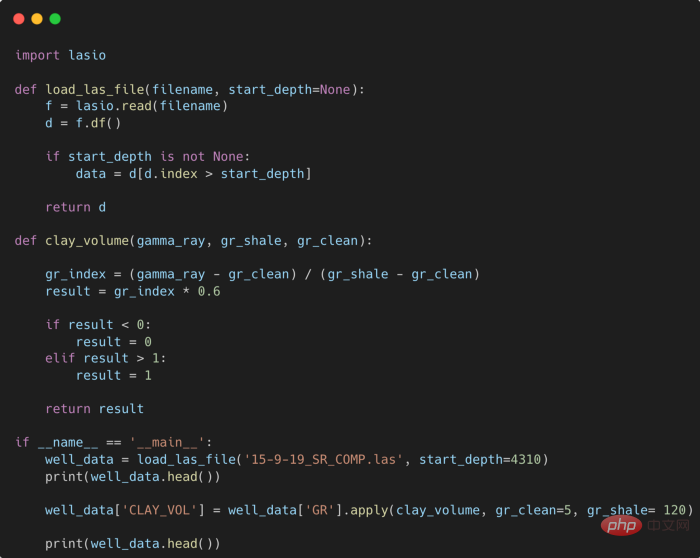
In this article, I will cover 5 basic tips on how to improve the readability of your application/script through documentation, prompt input, and proper variable names. .
1. Comments
The first thing we can do to the code is to add comments to certain lines, but be careful to avoid commenting too much. Comments need to explain why the code works, or why something is done in a certain way, rather than how it is implemented. Comments in Python are usually completed using the pound sign (#), which can span one line or multiple lines.
# Comment using the hashtag # Another comment using the hashtag
For multi-line comments, we can also use double quotes.
""" This is an example of a multi-line comment """
In the example below, some comments have been added to the code to explain how certain lines of code work and why:
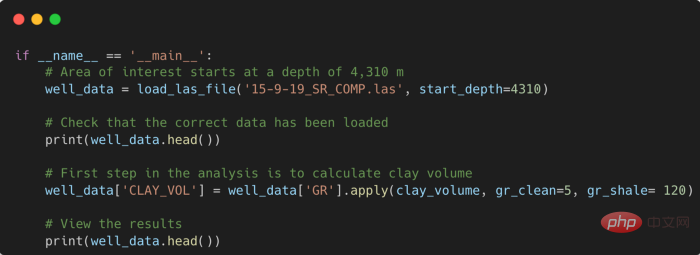
2. Display Type typing
The Python language is dynamically typed, which means that variable types are only checked at runtime. Additionally, variables can change type during code execution. Static typing, on the other hand, involves declaring the variable type explicitly and cannot change during code execution.
In 2014, PEP 484 introduced the concept of type hints, which was subsequently introduced into Python 3.5. This allows you to declare variable types explicitly. By adding type hints, you can significantly improve the readability of your code. In the following example, we can see:
- Requires two parameters
- The type of the parameter filename is a string
- The type of the parameter start_depth is a float type , and the default value of this parameter is None
- This function will return a pandas DataFrame object
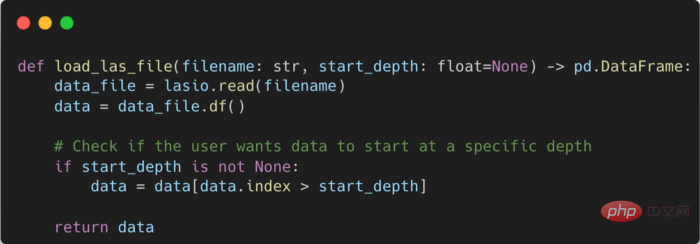
According to the type hint, we can know exactly the function What is required, and what it will return.
3. Documentation string
The documentation string is the string immediately following the function or class definition. Docstrings are a great way to explain in detail what a function does, what arguments it takes, what exceptions it will throw, its return value, and more. Additionally, if you use a tool like Sphinx to create online documentation for your code, the docstrings will be automatically extracted and converted into the appropriate documentation. The following example shows the docstring for a function named clay_volume. Here we can specify the meaning of each parameter. This makes it more detailed than basic type hints. You can also include more information about the methodology behind the function, such as academic references or equations.
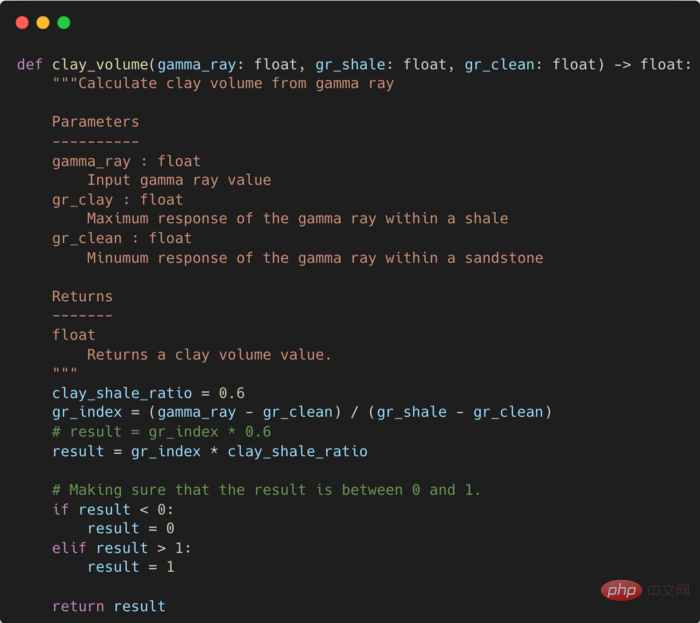
#Document strings are also very helpful when we call functions elsewhere in the code. For example, when writing code using Visual Studio, you can hover over a function call and see a popup showing what the function does and what it requires.
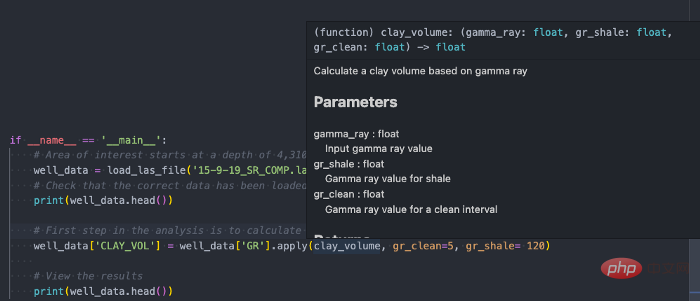
If you use Visual Studio Code (VS Code) to edit your Python code, you can use extensions like autoDocstring to make the process of creating docstrings easier. You can enter three double quotes and the rest of the template will automatically fill in. You just need to fill in the details.
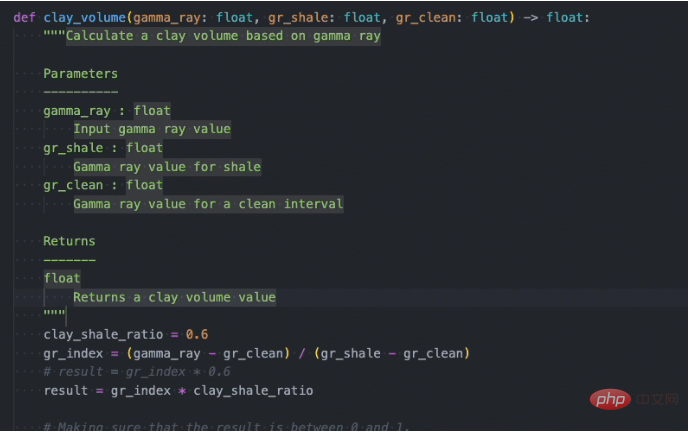
Tip: If you have declared types in the parameters, they will be automatically selected.
4. Readable variable names
Sometimes, when you are writing code, you don’t care too much about the names of variables, especially when time is tight. However, if you go back and look at the code and you find a series of variables named x1 or var123, you may not understand at first glance what they represent. In the example below, there are two variables f and d. We can guess the meaning of such variables by looking at other parts of the code, but this can take time, especially if the code is long.
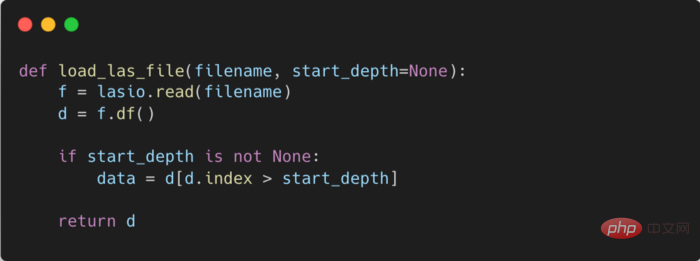
If we give these variables appropriate names, we will be able to know that one of the variables is the data_file read by the lasio.read() call, and is most likely the original data. The data variable tells us that this is the actual data we are dealing with.
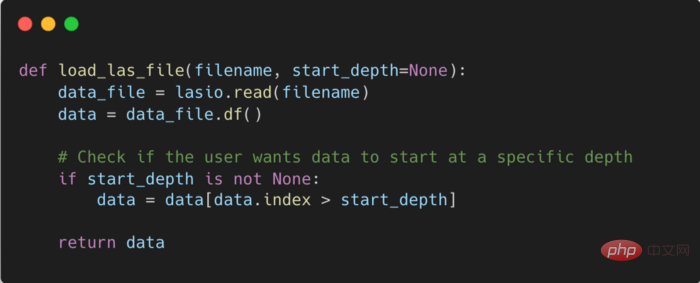
5. Avoid magic numbers
Magic numbers are values in code that have an unexplained meaning behind them and can be constants. Using these in code can cause ambiguity, especially if you are unfamiliar with using numbers in calculations. Furthermore, if we have the same magic number in multiple places, when it needs to be updated, we have to update every instance of it. However, if such numbers are assigned a suitably named variable, the substitution process becomes much easier. In the example below, we have a function that calculates a value called result and multiplies it by 0.6. What does this mean? Is it a conversion factor? A scalar?
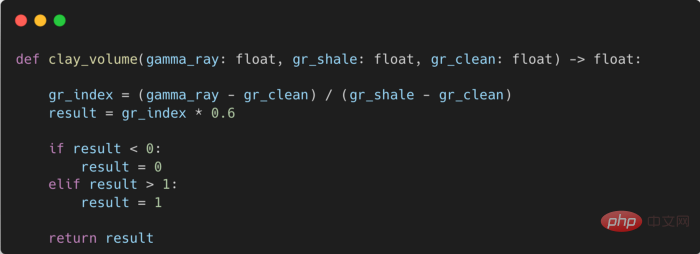
If we declare a variable and assign the value to it then we are more likely Know what it is. In this case, the ratio of clay to shale is used to convert the gamma-ray index to clay volume.
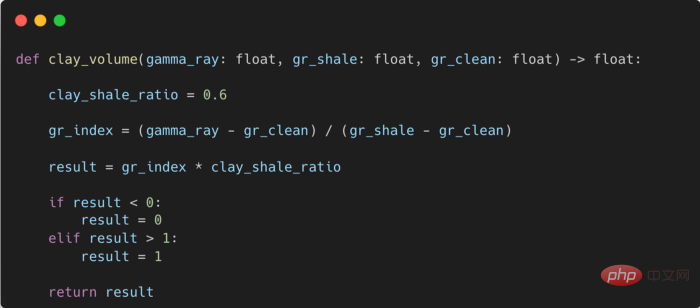
6. Final Code
After applying the above tips, our final code now looks cleaner and easier to understand.
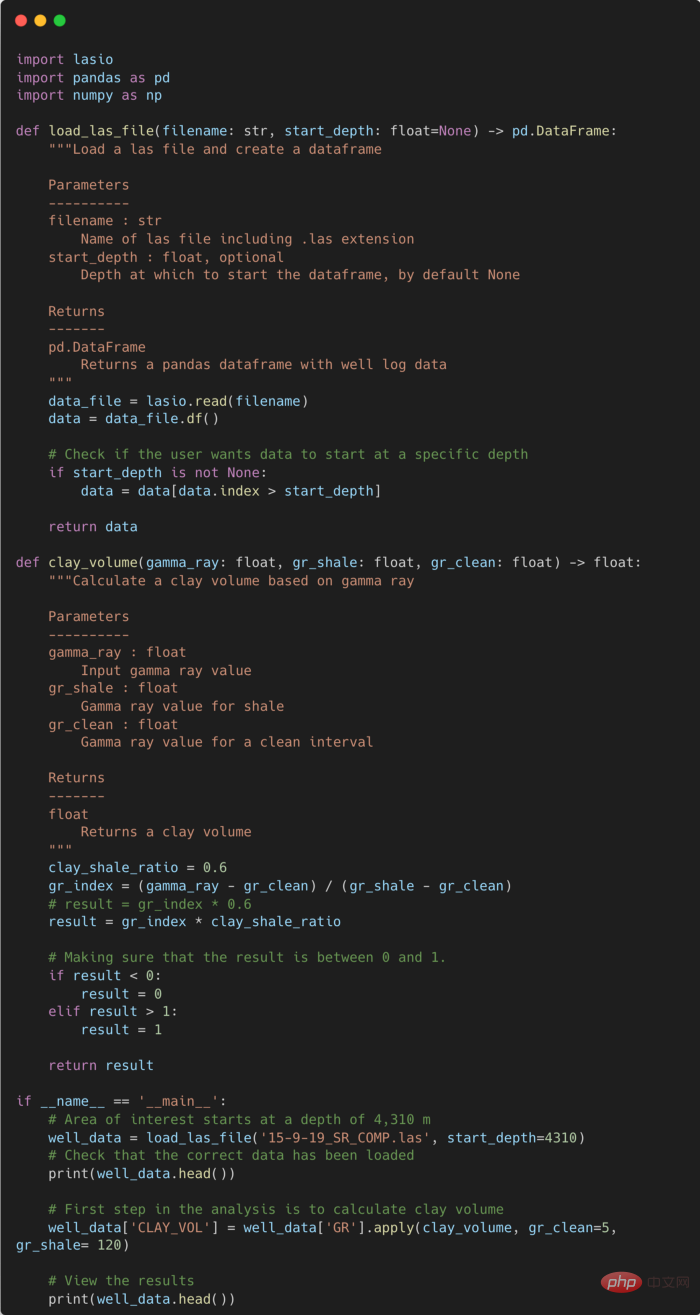
7. Summary
Adding descriptions to your code through comments and docstrings can help you and others understand what the code is doing. It may feel like a chore at first, but with the use of the tools and regular practice, it will become second nature.
Original link: https://towardsdatascience.com/5-essential-tips-to-improve-the-readability-of-your-python-code-a1d5e62a4bf0
Translator’s introduction
Zhao Qingyi, 51CTO community editor, has been engaged in driver development for many years. His research interests include secure OS and network security fields, and he has published network-related patents.
The above is the detailed content of Five essential tips to improve the readability of Python code. For more information, please follow other related articles on the PHP Chinese website!

Hot AI Tools

Undresser.AI Undress
AI-powered app for creating realistic nude photos

AI Clothes Remover
Online AI tool for removing clothes from photos.

Undress AI Tool
Undress images for free

Clothoff.io
AI clothes remover

AI Hentai Generator
Generate AI Hentai for free.

Hot Article

Hot Tools

Notepad++7.3.1
Easy-to-use and free code editor

SublimeText3 Chinese version
Chinese version, very easy to use

Zend Studio 13.0.1
Powerful PHP integrated development environment

Dreamweaver CS6
Visual web development tools

SublimeText3 Mac version
God-level code editing software (SublimeText3)

Hot Topics
 1377
1377
 52
52
 Do mysql need to pay
Apr 08, 2025 pm 05:36 PM
Do mysql need to pay
Apr 08, 2025 pm 05:36 PM
MySQL has a free community version and a paid enterprise version. The community version can be used and modified for free, but the support is limited and is suitable for applications with low stability requirements and strong technical capabilities. The Enterprise Edition provides comprehensive commercial support for applications that require a stable, reliable, high-performance database and willing to pay for support. Factors considered when choosing a version include application criticality, budgeting, and technical skills. There is no perfect option, only the most suitable option, and you need to choose carefully according to the specific situation.
 How to use mysql after installation
Apr 08, 2025 am 11:48 AM
How to use mysql after installation
Apr 08, 2025 am 11:48 AM
The article introduces the operation of MySQL database. First, you need to install a MySQL client, such as MySQLWorkbench or command line client. 1. Use the mysql-uroot-p command to connect to the server and log in with the root account password; 2. Use CREATEDATABASE to create a database, and USE select a database; 3. Use CREATETABLE to create a table, define fields and data types; 4. Use INSERTINTO to insert data, query data, update data by UPDATE, and delete data by DELETE. Only by mastering these steps, learning to deal with common problems and optimizing database performance can you use MySQL efficiently.
 MySQL can't be installed after downloading
Apr 08, 2025 am 11:24 AM
MySQL can't be installed after downloading
Apr 08, 2025 am 11:24 AM
The main reasons for MySQL installation failure are: 1. Permission issues, you need to run as an administrator or use the sudo command; 2. Dependencies are missing, and you need to install relevant development packages; 3. Port conflicts, you need to close the program that occupies port 3306 or modify the configuration file; 4. The installation package is corrupt, you need to download and verify the integrity; 5. The environment variable is incorrectly configured, and the environment variables must be correctly configured according to the operating system. Solve these problems and carefully check each step to successfully install MySQL.
 MySQL download file is damaged and cannot be installed. Repair solution
Apr 08, 2025 am 11:21 AM
MySQL download file is damaged and cannot be installed. Repair solution
Apr 08, 2025 am 11:21 AM
MySQL download file is corrupt, what should I do? Alas, if you download MySQL, you can encounter file corruption. It’s really not easy these days! This article will talk about how to solve this problem so that everyone can avoid detours. After reading it, you can not only repair the damaged MySQL installation package, but also have a deeper understanding of the download and installation process to avoid getting stuck in the future. Let’s first talk about why downloading files is damaged. There are many reasons for this. Network problems are the culprit. Interruption in the download process and instability in the network may lead to file corruption. There is also the problem with the download source itself. The server file itself is broken, and of course it is also broken when you download it. In addition, excessive "passionate" scanning of some antivirus software may also cause file corruption. Diagnostic problem: Determine if the file is really corrupt
 How to optimize MySQL performance for high-load applications?
Apr 08, 2025 pm 06:03 PM
How to optimize MySQL performance for high-load applications?
Apr 08, 2025 pm 06:03 PM
MySQL database performance optimization guide In resource-intensive applications, MySQL database plays a crucial role and is responsible for managing massive transactions. However, as the scale of application expands, database performance bottlenecks often become a constraint. This article will explore a series of effective MySQL performance optimization strategies to ensure that your application remains efficient and responsive under high loads. We will combine actual cases to explain in-depth key technologies such as indexing, query optimization, database design and caching. 1. Database architecture design and optimized database architecture is the cornerstone of MySQL performance optimization. Here are some core principles: Selecting the right data type and selecting the smallest data type that meets the needs can not only save storage space, but also improve data processing speed.
 Does mysql need the internet
Apr 08, 2025 pm 02:18 PM
Does mysql need the internet
Apr 08, 2025 pm 02:18 PM
MySQL can run without network connections for basic data storage and management. However, network connection is required for interaction with other systems, remote access, or using advanced features such as replication and clustering. Additionally, security measures (such as firewalls), performance optimization (choose the right network connection), and data backup are critical to connecting to the Internet.
 Solutions to the service that cannot be started after MySQL installation
Apr 08, 2025 am 11:18 AM
Solutions to the service that cannot be started after MySQL installation
Apr 08, 2025 am 11:18 AM
MySQL refused to start? Don’t panic, let’s check it out! Many friends found that the service could not be started after installing MySQL, and they were so anxious! Don’t worry, this article will take you to deal with it calmly and find out the mastermind behind it! After reading it, you can not only solve this problem, but also improve your understanding of MySQL services and your ideas for troubleshooting problems, and become a more powerful database administrator! The MySQL service failed to start, and there are many reasons, ranging from simple configuration errors to complex system problems. Let’s start with the most common aspects. Basic knowledge: A brief description of the service startup process MySQL service startup. Simply put, the operating system loads MySQL-related files and then starts the MySQL daemon. This involves configuration
 How to optimize database performance after mysql installation
Apr 08, 2025 am 11:36 AM
How to optimize database performance after mysql installation
Apr 08, 2025 am 11:36 AM
MySQL performance optimization needs to start from three aspects: installation configuration, indexing and query optimization, monitoring and tuning. 1. After installation, you need to adjust the my.cnf file according to the server configuration, such as the innodb_buffer_pool_size parameter, and close query_cache_size; 2. Create a suitable index to avoid excessive indexes, and optimize query statements, such as using the EXPLAIN command to analyze the execution plan; 3. Use MySQL's own monitoring tool (SHOWPROCESSLIST, SHOWSTATUS) to monitor the database health, and regularly back up and organize the database. Only by continuously optimizing these steps can the performance of MySQL database be improved.



